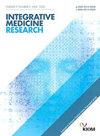中医治疗失眠:概括性回顾和证据图谱
IF 3
4区 医学
Q2 INTEGRATIVE & COMPLEMENTARY MEDICINE
引用次数: 0
摘要
越来越多的系统综述和荟萃分析(SR/MAs)表明,中药治疗失眠是有效的。我们的目的是综合和评价这些研究的方法学质量,通过一个综合评价和证据图来提高证据质量。方法我们检索了从成立到2025年3月20日的10个数据库,这些数据库调查了中医疗法对失眠患者睡眠相关的主观或客观结局的影响。我们使用评估系统评价的测量工具(AMSTAR 2)工具评估纳入的SR/ ma的方法学质量,使用建议评估、发展和评价分级(GRADE)工具评估证据的确定性,并以证据图的形式可视化地呈现结果。结果纳入的36个SR/ ma共涉及3种中医非药物疗法(即针灸、推拿和中医运动)和中草药(CHM)。AMSTAR 2结果显示,20个SR/ ma具有高或中等的方法学质量,而其余研究的方法学质量较低或极低。证据图显示,高质量的SR/MAs支持针灸、推拿按摩、中医锻炼对整体睡眠质量的影响,同时针灸、推拿按摩和中医锻炼也能改善焦虑和抑郁。此外,针灸和推拿按摩可能改善客观结果,如多导睡眠图参数和5-羟色胺水平。结论针刺、推拿按摩和中医操能有效改善整体睡眠质量和情绪结局,并对客观睡眠参数有潜在影响。有足够的证据表明,几种中药配方可以改善睡眠质量。然而,SR/MAs的方法学质量需要进一步提高。协议注册普洛斯普洛斯,CRD42022347769。本文章由计算机程序翻译,如有差异,请以英文原文为准。
Traditional Chinese medicine therapies for insomnia: An umbrella review and evidence map
Background
An increasing number of systematic reviews and meta-analyses (SR/MAs) suggests traditional Chinese medicine therapies are effective for insomnia. We aimed to synthesize and evaluate the methodological quality of these studies through an umbrella review with an evidence map for improving evidence quality.
Methods
We searched 10 databases from inception to March 20, 2025, that investigated the effects of TCM therapies on sleep-related subjective or objective outcomes for insomnia. We assessed the methodological quality of included SR/MAs using A Measurement Tool to Assess systematic Reviews (AMSTAR 2) tool, evaluated the certainty of evidence with the Grading of Recommendations Assessment, Development, and Evaluation (GRADE) tool, and visually presented the results as an evidence map.
Results
Thirty-six SR/MAs included in this umbrella review described 3 TCM non-pharmacotherapies (i.e., acupuncture, Tuina massage, and Chinese exercises), and Chinese herbal medicine (CHM). The AMSTAR 2 results showed that 20 SR/MAs had high or moderate methodological quality, while the remaining studies were of low or critically low methodological quality. The evidence map showed high-quality SR/MAs supported the effect of acupuncture, Tuina massage, Chinese exercises, and CHM on overall sleep quality, while acupuncture, Tuina massage, and Chinese exercises could also improve anxiety and depression. Moreover, acupuncture and Tuina massage might improve objective outcomes such as polysomnography parameters and 5-hydroxytryptamine level.
Conclusions
Acupuncture, Tuina massage, and Chinese exercises are effective in improving overall sleep quality and emotional outcomes and have potential effects on objective sleep parameters. There is sufficient evidence that several CHM formulas could improve sleep quality. However, the methodological quality of SR/MAs needs further improvement.
Protocol registration
PROSPERO, CRD42022347769.
求助全文
通过发布文献求助,成功后即可免费获取论文全文。
去求助
来源期刊

Integrative Medicine Research
Medicine-Complementary and Alternative Medicine
CiteScore
6.50
自引率
2.90%
发文量
65
审稿时长
12 weeks
期刊介绍:
Integrative Medicine Research (IMR) is a quarterly, peer-reviewed journal focused on scientific research for integrative medicine including traditional medicine (emphasis on acupuncture and herbal medicine), complementary and alternative medicine, and systems medicine. The journal includes papers on basic research, clinical research, methodology, theory, computational analysis and modelling, topical reviews, medical history, education and policy based on physiology, pathology, diagnosis and the systems approach in the field of integrative medicine.
 求助内容:
求助内容: 应助结果提醒方式:
应助结果提醒方式:


